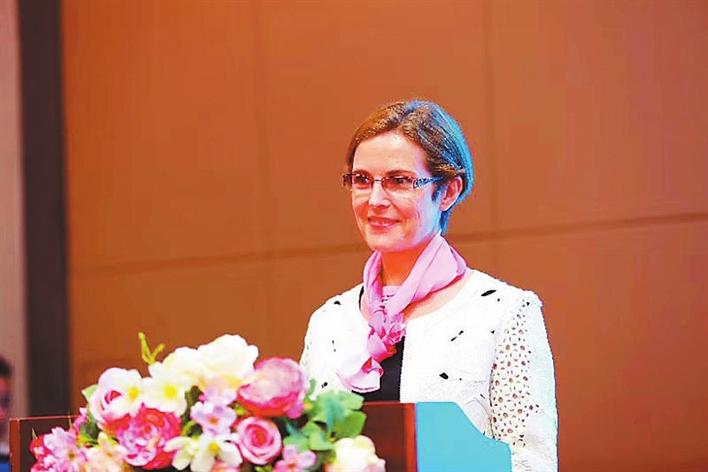
Francine Hadjisotiriou
Fourteen years ago when she was offered a chance to move to another city after spending two years in Nanjing, capital of East China’s Jiangsu Province, Francine Hadjisotiriou, currently general manager of the European Chamber South China Chapter, selected Shenzhen after some online searching regarding education for her two children.
“After checking out websites of international schools, we saw a modern city with palm trees and swimming pools and we immediately said ‘yes,’” recalled the Frenchwoman, who has lived in Shenzhen ever since.
In 2006, the European Chamber South China Chapter only had one office in Guangzhou, and Hadjisotiriou had to commute between Guangzhou and Shenzhen frequently. A year later, she decided to establish the Shenzhen office after seeing the potential growth of foreign investors and enterprises in the city, and she was right.
“When I first arrived here, there were very few business organizations that had a Shenzhen office,” she said.
“As I was living in Shenzhen, I had the opportunity to meet aspiring entrepreneurs and businesspeople from big multinationals, which made me decide to open the Shenzhen office, and I think it was a smart choice.”
Since Shenzhen issued the first business license for a foreign-funded company in 1981, more than 90,000 foreign firms have been established in the city, with a cumulative contractual foreign investment of nearly US$300 billion and the actual use of the foreign capital exceeding US$100 billion.
“Take the European Chamber South China Chapter as an example, we have around 300 member companies in the South China Chapter. A third of them set up companies in Shenzhen. 43.2 percent are manufacturing companies, over 20 percent of which have set up R&D centers in Shenzhen,” explained Hadjisotiriou.
Regarding R&D centers, Hadjisotiriou said that 10 years ago some companies were reluctant to establish R&D centers for fear of IPR infringement.
“However, the trust has grown, and the companies understood that there are a lot of benefits to have an R&D center in China. The overall situation regarding IPR has improved tremendously in China, even though a lot of progress is still needed,” said Hadjisotiriou.
For Hadjisotiriou, what attracts foreign companies to come and settle down in Shenzhen is its dynamic business environment, which is in part due to the unique DNA of the city with young people from all over China.
“Their positive mindset, their can-do attitude, their determination to achieve and willingness to go the extra mile, are really important. These create the whole Shenzhen ecosystem with a lot of startups and smart manufacturing.
The young people also bring dynamism to the company they work for,” said Hadjisotiriou.
“What also shapes the business environment are the clarity and predictability of regulatory measures, as well as the support of the Shenzhen government to companies, both multinationals and small and medium-sized enterprises (SMEs), when they face challenges. This is what the European Chamber is addressing to the government, as the economy always benefits from an improved business environment. With the economic downturn due to the pandemic, many SMEs have suffered, especially the service sector. Many have closed down, which could have been prevented,” added Hadjisotiriou.
Despite increased challenges, most companies remain committed to China. According to the European Chamber Business Confidence Survey 2020, in South China, 83 percent of the members would choose South China to expand their current businesses and 88 percent of respondents expressed their commitment to South China over the coming three years.
According to Hadjisotiriou, over the years, the total investment of European enterprises in Shenzhen has increased while the total number of enterprises continuously decreases. “Companies that are not innovative any more are leaving,” Hadjisotiriou said.



